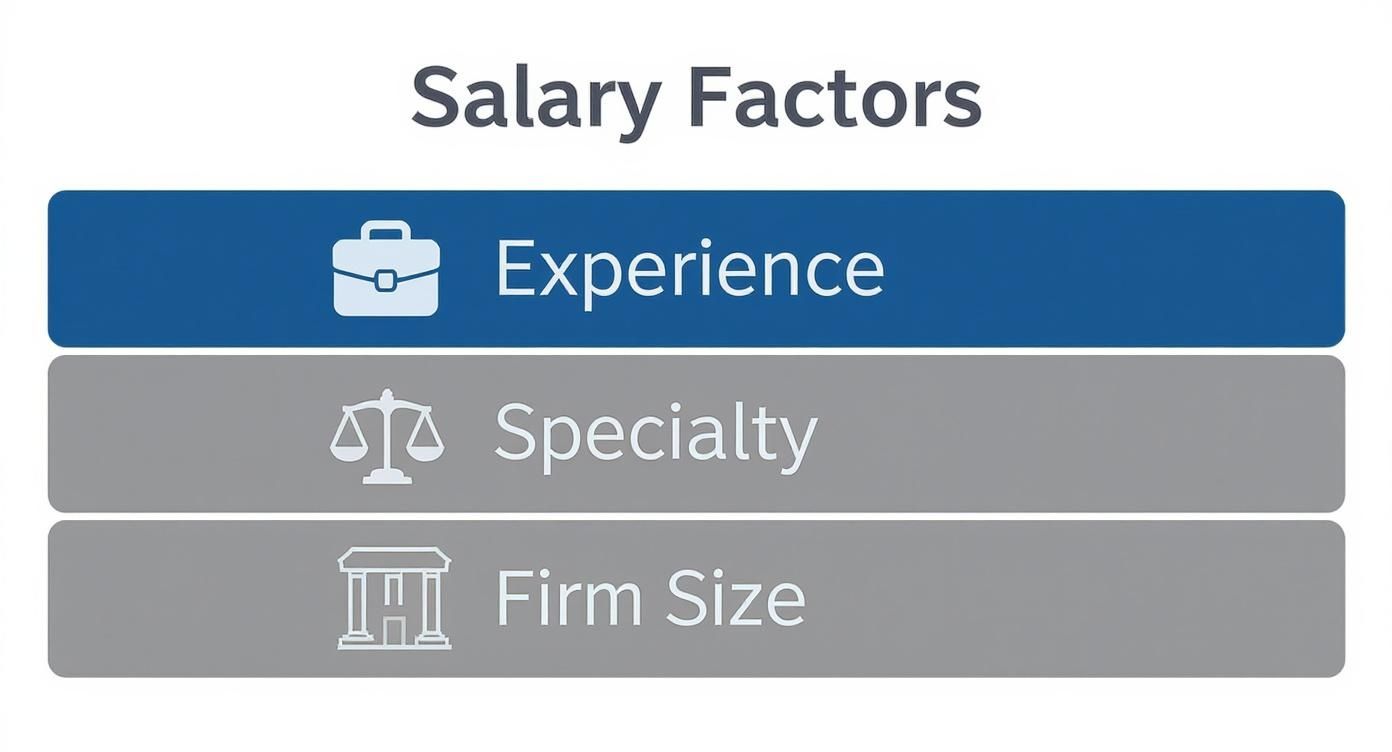
 17 minutes read
17 minutes read
Let's cut the fluff. You're a paralegal in Phoenix—or want to be—and you need to know the number. The real number. The average paralegal salary in Phoenix, AZ is tossed around as $59,000 per year.
But "average" is for spreadsheets. You and I know that's not what lands in your bank account. That number is a myth, a mirage in the Valley of the Sun. Your actual paycheck depends on whether you play the game right. So let's talk strategy.
That $59,000 figure is a decent starting point, but it's where the conversation begins, not where it ends. What you actually pocket can swing wildly based on one thing: your experience. Forget piecing together conflicting data from a dozen job boards. We're in the trenches connecting firms with talent every day, and these are the real-world numbers. (Toot, toot!)
This isn't just trivia for your next networking lunch. This is the financial baseline you need to know.
The data is brutally clear—your paycheck grows when you do. Recent numbers pin the average paralegal salary in Phoenix at $58,997 per year.
Fresh-faced rookies are looking at a starting line around $42,500. Paralegals with a few years under their belt, the ones who don't need hand-holding, should be seeing closer to $54,349. And the seasoned vets? The ones who can smell a bad deposition from a mile away? They're pulling down $85,000 or more. Why? Because expertise is the most valuable commodity in any law firm. You can see the raw data for yourself over at Payscale.com.
This is leverage. It's the ammo you bring to your next performance review or use to sniff out a lowball offer.

The Bottom Line: If you’re a paralegal with solid experience in Phoenix and you’re making less than $60,000, it's time for a gut check. The market pays for skill. Don't leave your money on someone else's table.
Think of your paralegal career in Phoenix like a video game with financial tiers. You can't get to the boss level without clearing the early stages. Knowing which tier you're in is step one. Leveling up is step two.
Here’s the cheat sheet for what to expect.
This isn't gospel, but it's a damn good benchmark for planning your next move.
| Experience Level | Typical Annual Salary Range |
|---|---|
| The Rookie (0-2 Years) | $42,000 – $50,000 |
| The Seasoned Pro (3-7 Years) | $55,000 – $75,000 |
| The Veteran (8+ Years) | $75,000 – $85,000+ |
Let's break down what these labels actually mean in the real world.
If you have five years of rock-solid experience but your paycheck is stuck in rookie mode, something is broken. That's your cue to either have a very frank conversation or start polishing your resume. The paralegal jobs in Phoenix, Arizona are out there, waiting for someone with your market value.
We've established the "average" salary is mostly useless. The real story—and the real money—is in the range. How is it that one paralegal in Phoenix is scraping by on $45,000 while another is clearing six figures?
It's not luck. It's a formula: Experience + Specialty + Firm Type.
Let's get past the vague idea of "market rate" and talk about the levers you can actually pull to climb out of the bargain bin and into the premium tier.
This one seems obvious, but people still underestimate its power. Experience isn’t about seat time; it’s about the number of fires you've put out. It's the wisdom to see a problem coming and the autonomy to solve it without dragging a partner into the weeds. That kind of peace of mind is worth a fortune to any attorney.
The paychecks don't lie. Phoenix paralegal salary data shows a mind-boggling range, from $61,315 for mid-level folks to a staggering $127,327 for senior specialists. Top earners are billing out at $28 to $60 per hour. Why? Because firms will happily pay a premium to avoid expensive mistakes. You can dig into the numbers yourself on Salary.com.

Here's the takeaway: Your salary isn't a reward for showing up. It's a direct reflection of the problems you can solve without needing adult supervision.
Let's be blunt: not all legal fields are created equal. A paralegal handling routine divorces isn't going to make the same as one navigating a billion-dollar patent lawsuit. It's just simple economics. High-revenue practice areas can afford to pay their teams more.
Sure, you should be passionate about what you do. But if your goal is to maximize your income, you need to follow the money into a high-demand, high-revenue specialty.
Finally, a mega-firm downtown with a national reputation has more cash to throw around than a two-attorney firm in a strip mall. It’s that simple. Big firms don't just offer bigger base salaries; they have the structured bonus programs and gold-plated benefits to match.
Your credentials matter, too. Arizona doesn't mandate paralegal certification, but earning one is a powerful negotiating chip. It tells a hiring manager you're serious. Understanding the paralegal certification requirements can give you a massive edge. When a firm is staring at two identical resumes, the certified one gets the call—and the better offer.
It’s easy to get tunnel vision. You know the Phoenix firms, you know the players, and you think you have the full picture. But zoom out. How does a paralegal salary in Phoenix, AZ really compare to Tucson, or to the rest of the country?
Let’s be real: a $65,000 salary in Phoenix feels a lot different than the same number in Prescott. This is about understanding your true market value. Are you getting a good deal here in the Valley, or are you getting taken for a ride?
Inside Arizona, Phoenix is the undisputed heavyweight champ of paralegal pay. It’s not even a fair fight. Your counterparts in Yuma or Flagstaff are looking at averages in the $50,000 to $58,000 range. Phoenix just plays in a different league.
Statewide salary data shows the average Arizona paralegal makes about $66,000. But here in the Phoenix metro, that number jumps to $69,180 annually, or $33.26 per hour. And for the top 10%? The real pros? We're talking nearly $99,290. This isn't a fluke. It's a bigger market with bigger cases and—most importantly—bigger budgets.
This infographic breaks down the drivers behind that pay gap.

These aren't just "influences." They are the levers that decide whether you're at the top or bottom of the food chain.
Okay, so Phoenix rules the Arizona roost. But what happens when you put it on the national stage? This is where it gets interesting.

The truth is, Phoenix is a sweet spot. You get a competitive, big-city salary without the soul-crushing cost of living you'd find in a coastal hub. You can actually afford to live here.
Let's put some numbers to that claim.
| Location | Average Annual Paralegal Salary |
|---|---|
| Phoenix, AZ | $69,180 |
| Tucson, AZ | $55,870 |
| Denver, CO | $69,330 |
| Dallas, TX | $70,050 |
| U.S. National Average | $64,860 |
Source: U.S. Bureau of Labor Statistics (BLS), May 2023 Metropolitan and Nonmetropolitan Area Occupational Employment and Wage Estimates.
The data shows the salary for a paralegal in Phoenix, AZ isn't just strong for Arizona—it's strong, period. We're right there with Denver and Dallas, and well above the national average. You’re not taking a pay cut for the sunshine. You're getting a major-market paycheck without having to mortgage your office ping-pong table for rent. That’s a win.

It’s so easy to get fixated on the base salary. You see that big, shiny number on a job posting and your brain short-circuits. Stop it. If that's the only number you look at, you’re making a rookie mistake—and probably leaving a boatload of money on the table.
A slightly lower base pay with a killer benefits package is almost always better than a higher salary with junk health insurance and no 401(k) match. It’s time to start evaluating the whole offer, not just the sticker price.
We need to talk total compensation. This is your salary plus health insurance, retirement, bonuses, PTO, and professional development. Let's break down how to calculate the true value of an offer so you don't get played.
That $65,000 base salary looks great until you realize the health insurance deductible is $10,000 and the 401(k) match is nonexistent. Don't let a big number blind you to the fine print.
You have to do the math. A firm contributing 3-6% to your 401(k) is literally giving you free money. A great health plan can be worth $15,000 a year, easy. These aren't perks; they're huge parts of your financial health.

The question isn't just "What's the salary?" It's "What's my all-in number?" A firm that invests in your future is a firm that values you. One that skimps is telling you exactly what they think you're worth.
To see what an offer is really worth, you need to tear it apart. Focus on the hard numbers. A competitive package should have most of these:
When you get an offer, open a spreadsheet. Seriously. List the salary, then start adding the dollar value of each benefit. Only then will you know which paralegal salary in Phoenix, AZ is actually the best deal.

Let’s be real. Asking for more money is awkward. You know what's worse? Leaving thousands of dollars on the table because you were too nervous to speak up. It's time to stop negotiating against yourself and start acting like the professional you are.
This isn't about hope or luck. It's about preparation. A smart negotiation strategy can be the difference between a good year and a great one.
Walking into a negotiation without a specific number is like showing up to trial without your exhibits. You've already lost. Before you open your mouth, you need to anchor your request in cold, hard data—not what you "feel" you're worth.
Dive into the local market data for paralegal salaries in Phoenix, AZ. We’ve already laid out the pay scales. Your job is to pinpoint exactly where you fit based on your experience, specialty, and skills.

Don't pull a number out of thin air. If the market rate for a litigation paralegal with five years of experience in Phoenix is $70,000, that’s your starting point, not your fantasy.
Once you have your number, you have to justify it. A hiring manager doesn't care what you want; they care about the value you bring. You have to connect the dots for them.
Create a "brag sheet." Don't just list your duties; quantify your wins.
See the difference? You’re not just an expense. You’re an asset who mitigates risk and drives efficiency. That’s what they pay for.
It's showtime. This is a business conversation, not a therapy session. And yes, you should practice. Rehearse your key points out loud. It feels weird, but it works.
When you're in the room, be calm and direct. Try this:
"Based on my research of the Phoenix market for a paralegal with my [X years] of experience in [specialty], and considering my contributions here—like [mention your best win]—I believe a salary of [Your Target Number] more accurately reflects my value to the firm."
Then, the hardest part: Shut up.
Let the silence hang. Let them respond. Don't immediately backtrack or apologize. You’ve done your homework, you’ve built your case, and you know your worth. Now, stand your ground.
So, is Phoenix a career launchpad or just another dusty stop on the highway? Let's skip the "future is bright" nonsense and talk about what’s actually happening on the ground.
Hope is not a strategy. If you ignore these market shifts, you're going to get steamrolled.
The pandemic blew up the old rules. Remote work isn't a fad; it's a permanent part of the legal world. A Phoenix firm isn't just competing for talent with the office next door; they're competing with firms in Denver, Dallas, and Des Moines.
This is a double-edged sword. You can land a top-tier job from your couch, but your firm can also hire someone from a cheaper state.

Here’s the bottom line: Your competition is now global. To command a top paralegal salary in Phoenix, AZ, you have to bring skills that can't be outsourced for less.
The era of the jack-of-all-trades paralegal is over. Firms aren't looking for generalists anymore. They want specialists—problem-solvers who can hit the ground running.
Look at the Phoenix economy: tech, healthcare, real estate. It's booming. That boom creates a direct need for niche expertise.
If your skills are stuck in 2015, so is your salary. The best way to future-proof your career is to become an indispensable expert in a high-demand field.
Let's be blunt: AI is coming for the repetitive tasks. Routine document review, basic research, data entry—that's all being automated. If that’s all you do, you're in trouble.
This isn't a doomsday prediction; it's a call to action. The paralegals who thrive will be the ones who manage the technology, analyze its output, and provide the human judgment no algorithm can replicate.
The paralegal of tomorrow is a project manager and tech supervisor, not a paper pusher. Embrace the tools that do the grunt work so you can focus on the high-value strategic thinking that justifies a top-tier salary. Adapt or become irrelevant.
Alright, let's wrap this up with a rapid-fire Q&A. No jargon, just the straight answers you need.
Follow the money. Right now in Phoenix, that means corporate law, complex litigation, real estate, and intellectual property. The city's growth in tech and commerce has created a feeding frenzy for paralegals who can handle high-stakes deals and complex filings. If you have skills in e-discovery or tech compliance, you're holding a royal flush.
Yes. Full stop. Don't think of it as just a certificate. A credential from an organization like NALA is third-party validation of your skills. It removes the guesswork for a hiring firm.

In a market this competitive, certification is a tiebreaker. It gives you the leverage to ask for the top end of the salary range, not the bottom. And leverage is money.
Massively. A huge national firm in a downtown high-rise will almost always pay more and have better benefits than a small shop in the suburbs. It's just a matter of resources. A smaller firm might offer a better culture or work-life balance, but that often comes at the cost of your base salary.
The big question. The answer is a frustrating "it depends." Many forward-thinking Phoenix firms get it; they pay the local market rate for your skills, not your zip code. But some old-school firms will try to lowball you if you live in a cheaper area. The key is to get clarity upfront. Ask about their remote compensation policy directly in the interview. Never assume.